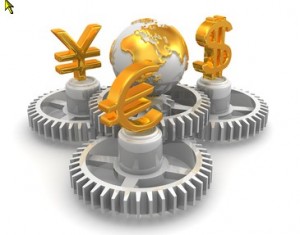While most of us don’t even consider foreign currency until we jet off abroad, others are pitting their wits and trying to make their first million on the highly volatile Forex market.
Many individuals and businesses are making huge sums of money trading foreign exchange. It is by far the largest financial market in the world, trading trillions of dollars each day.
While forex trading was once confined to large corporations and banks, a change in the regulations has made it possible for individual investors to enter the Forex market. This means than anyone can set themselves up as a trader with little more than a computer and internet connection.
For novices who wish to enter the market, there are several websites offering to set you up as a trader. Many of these provide various tools to get you started, including dummy accounts to practice trading, without spending money. See iforex promotions for a number of user friendly tools, including bonuses and a mobile platform for on the go trading.
Which factors affect the exchange rate?
For novice Forex investors, it is important to put some time into learning what effects currency rates. The pound is strong at the moment. So what is it that causes fluctuations in exchange rates and why is the pound strong one day and weaker the next? The fact is the Forex market is highly volatile and fluctuations can occur daily, and in the space of a few minutes.
Interest Rates
In the UK, there is much speculation about a possible rise in interest rates, which could be good news for the pound. As a general rule countries with higher interest rates will see currency values increase.
Inflation and Recession
These both have an impact on the ability of a country to buy goods and services on the international market. During a recession, purchasing power decreases as does the value of currency. The opposite happens during periods of inflation when currency rates increase.
Economic
Various factors can have an impact on currency rates, including interest rates, changes in monetary policy and international investments. Factors such as the slowing of economic growth can result in a decline in the value of currency.
Foreign Debt
Currency values are higher when foreign debt is at a sustainable level and the country is able to meet debt repayments. When a country is struggling with foreign debt, currency rates tend to fall.
Political factors
Political instability can have a negative impact on currency rates. The country will be seen as a bad place for business and the economy will suffer. In calm political situations, currency rates tend to be more stable.
As a forex trader, it’s good to look at the whole picture. How is the country doing economically and politically and are interest rates high or low? These factors and others could have an impact on currency values.
There is always more than one factor that moves a currency, but interest is one of the most significant. Being aware of these issues is essential for anyone contemplating entering the Forex market.







